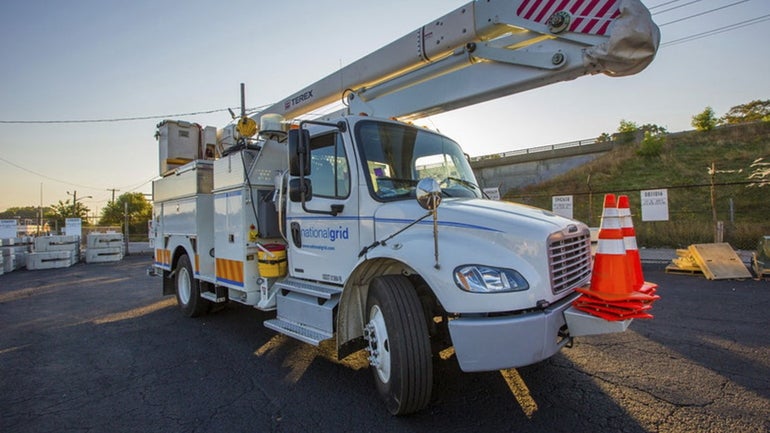A conservation group announced plans Tuesday to sue National Grid, alleging methane leaks from the utility’s neighborhood pipelines are killing trees, creating explosion hazards, and constitute federal and state violations.
The Conservation Law Foundation called its notice of intent to sue part of its effort to prevent methane leaks that the group said are also costing families and businesses money “for gas that never reaches their home or office.”
“National Grid is playing a dangerous and expensive game of whack-a-mole with its ancient, leaky gas pipelines, and families and businesses are taking the hit,” CLF Vice President Heather Govern said in a statement. “These continuous gas leaks are not just costly, they jeopardize lives, destroy homes, and worsen urban heat by suffocating trees. Band-Aids on aging gas pipelines are not solutions. Our communities need a safer, cleaner approach now.”
National Grid spokesperson Michael Dalo declined to comment Tuesday on the pending litigation.
According to CLF, methane levels from leaks were “dangerously high” in Chelsea and the Boston neighborhoods of Chinatown, Dorchester, East Boston, Jamaica Plain, Mattapan, Roslindale, Roxbury, the South End, and along the Commonwealth Avenue Mall in the Back Bay.
CLF sent the notice to National Grid on behalf of itself and four other groups: GreenRoots, Boston Parks Advocates, Mothers Out Front, and Affected Citizens.
They wrote that they’re seeking a court order that requires National Grid to “correct all identified violations through direct implementation of control measures and demonstration of full regulatory compliance.”
They also plan to seek declaratory and injunctive relief, Govern and CLF staff attorney Ameya Gehi wrote, and “seek the full penalties allowed by law,” referring to U.S. Resource Conservation and Recovery Act violations that can add up to $90,702 per day, per violation.
Noting a fatal gas leak explosion in Baltimore over the weekend, the group recounted incidents of local disaster, including an injury from a 2022 manhole cover explosion in the Financial District, a 2019 basement fire in Mattapan, 2019 manhole explosions in Brookline, and the 2018 Merrimack Valley gas fires that damaged houses, killed one person, and injured many more.
The Legislature passed a bill aimed at stemming natural gas leaks a decade ago. The law, a conference report led by Rep. John D. Keenan and Sen. Benjamin Downing and approved by Gov. Deval Patrick in 2014 (Ch. 149), graded gas leaks on a three-tier system and assigned timelines by which they must be repaired.
The law defines a Grade 1 gas leak as one that “represents an existing or probable hazard to persons or property” and calls for its “repair as immediately as possible and continuous action until the conditions are no longer hazardous.” The responsible gas company is charged under the law to “immediately schedule a completion of repairs” and perform “continuous surveillance until the hazard or source of the leak is eliminated.”
In Tuesday’s notice, CLF alleged that National Grid data showed at least 879 cases where the company “failed to immediately commence repair and continuous action for hazardous Grade 1 leaks until it removes the hazardous conditions, eliminates the source of the leak, and completes permanent repairs.”
The federal Pipeline Safety Act “authorizes any person to ‘bring a civil action’ against another person for violating the statute, which includes certain state standards,” the group wrote.
Sending its own investigators out into the field over a one-year period from July 2023 to July 2024, CLF identified 15 locations where it said leaking National Grid infrastructure “pose an imminent explosion and fire hazard.”
The investigators found a 2.7 percent methane concentration last November at the foundation of the Saltonstall Building on the back side of Beacon Hill at 100 Cambridge St. The former state office building still houses the Executive Office of Energy and Environmental Affairs and agencies like the Department of Energy Resources. It is also the address of the state Department of Environmental Protection, one of the carbon-copy recipients of CLF’s memo.
The reading at the Saltonstall Building showed an “indication of gas which has migrated to an outside wall of a building where gas would likely migrate or into a tunnel” and constituted a hazardous Grade 1 level leak, CLF said.
The notice said CLF and the other four organizations reserve their right to file suit to protect against “explosion and fire risks and the loss of vital public shade trees,” unless National Grid “cures” violations of the Resource Conservation and Recovery Act within 90 days and the Pipeline Safety Act within 60 days.

